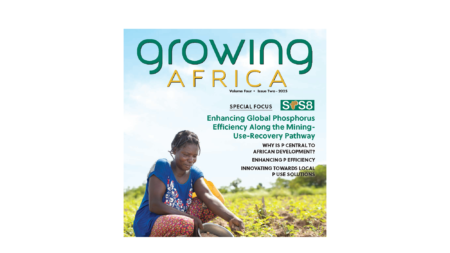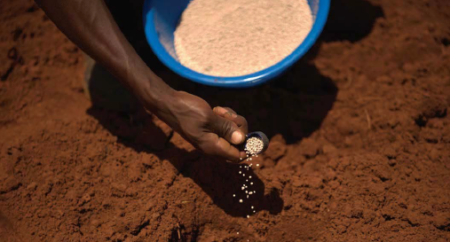By Canon Norris Savala Engoke, Ivan Adolwa, Esther Mugi, Samuel Njoroge, Kwame Frimpong, James Mutegi, Kaushik Majumdar, and Shamie Zingore
The emerging African Professional Certified Agronomy Advisory Program (PCAAP) is an APNI initiative aimed at providing farmers with access to high quality agronomy advisory services. Its framework encompasses a multi-faceted approach, including the training and certification of agronomy professionals, development of strategic partnerships with private, governmental and non-governmental entities, and the use of innovative communication technologies for information dissemination and sharing. By collaborative promotion of precision nutrient management such as 4R practices and empowering smallholder farmers, PCAAP has the potential to enhance food security, mitigate environmental degradation, and contribute to overall economic development in the region.
Agriculture plays a crucial role in the economies of many African nations, serving as a primary source of livelihood for a significant portion of the population. It contributes substantially to GDP and employment, particularly in rural regions where subsistence farming predominates. Agriculture is also vital for export earnings, with commodities such as cocoa, coffee, and tea forming the cornerstone of international trade (Jayne et al., 2023).

Despite this importance, the sector faces a multitude of challenges that limit its full potential. One major challenge is the limited access to modern agronomic practices and advisory services, which deprives farmers of essential resources to take full advantage of high-quality seeds, fertilizer and organic nutrients, and machinery for enhanced efficiency and yields (Masangano and Mthinda, 2017). African agriculture is also highly vulnerable to climate change and variability, with extreme weather events posing significant threats to crop production and livestock rearing. Strengthened advisory services will improve mitigation strategies of smallholder farmers, who are particularly susceptible to climatic shocks that lead to food insecurity and economic losses (Alston et al., 2022). Access to financial services and markets is another significant barrier, impeding farmers’ ability to invest in modern inputs and technologies. Policy and regulatory constraints, bureaucratic inefficiencies, and land tenure issues further hinder agricultural development across Africa (Bambio et al., 2022).
There is a strong need for an African Professional Certified Agronomy Advisory Program (PCAAP) to address these challenges by building capacity among agronomy professionals, promoting sustainable agricultural practices, and improving food security and economic resilience in Africa.
In Kenya, extension specialist have worked with smallholder farmers to enhance soil fertility through the adoption of sustainable soil and crop management practices. By promoting practices such as conservation agriculture and organic farming, the program helped farmers increase yields while preserving soil health (Jayne et al., 2023). In Ghana, extension services have supported integrated pest and disease management strategies to combat common agricultural pests and diseases. Using biological control methods, crop rotation, and resistant crop varieties, reliance on chemical pesticides was reduced while effectively managing pest and disease outbreaks (Masangano and Mthinda, 2017). In Ethiopia, extension agents have introduced climate-resilient farming techniques to help farmers adapt to the challenges posed by climate change.
PCAAP framework overview
PCAAP is built upon a comprehensive framework that includes the training and certification of agronomy professionals, the development of strategic partnerships, the use of innovative communication technologies, and the provision of tailored advisory services to farmers (Fig. 1).

A cornerstone of PCAAP is its provision of a new capacity for rigorous training and certification of agronomy professionals. PCAAP seeks to collaborate with a diverse array of partners, including private companies, government agencies, research institutions (national and international) and non-governmental organizations, to leverage resources and expertise. These partnerships are crucial for comprehensive knowledge development, policy alignment and effective delivery of agronomy advisory services and to ensure the sustainability of PCAAP-linked interventions. Once fully developed, the program will use innovative digital tools and internet-based communication technologies to train agronomists and disseminate agronomic information to farmers. These technologies facilitate real-time communication and information sharing, allowing agronomy advisors and farmers to access timely knowledge, guidance and, in turn, share feedback for improvement (Camillone et al., 2020). A fully deployed PCAAP enables tailored advisory services based on the specific needs and contexts of farmers. These services include practical insights into soil and crop management, pest and disease control strategies, and climate-resilient farming techniques (Bambio et al., 2022).
Empowerment of farmers
PCAAP emphasizes the empowerment of farmers through the effective transfer of the skills and knowledge needed to improve their farming enterprises. The program’s implementation can also foster entrepreneurship among farmers, and within rural communities, by supporting the development of connected agribusinesses and value-added enterprises. Through a strengthened agronomic advisory base supported by PCAAP, better economic resilience is secured through it influence on building farmers’ awareness on opportunities to diversify their markets and income streams (Camillone et al., 2020). Actively involving local communities in the design and implementation of interventions spurred by PCAAP ensures that they are both culturally appropriate and contextually relevant. Initiatives such as farmer field schools, ‘living’ labs, and participatory research, tap into the power of community co-learning and co-ownership of agricultural research and education initiatives (Jayne et al., 2023).
Continuous monitoring and evaluation of the effectiveness and impact of PCAAP derived technology and its strengthened advisory interventions will be needed. This process ensures adequate assessment of progress towards program objectives, challenges and bottlenecks, and strategic adjustments needed (Alston et al., 2022). Allowing a pioneering PCAAP to refine and improve its approaches through an iterative process of learning and adaptation ensures responsiveness to the inevitably evolving needs and priorities of smallholder farmers in Africa (Masangano and Mthinda, 2017).
Conclusion
PCAAP represents a comprehensive approach to enhancing agricultural productivity and sustainability in Africa. It is designed to provide farmers with greater access to high-quality agronomy advisory services, promote sustainable farming practices, and foster community engagement. As such, PCAAP has the potential to significantly improve livelihoods and food security across the continent.
Further work is needed to ensure our capacity to assess the long-term impacts of PCAAP interventions and identify areas for improvement. Additionally, studies on the scalability and replicability of PCAAP models across different contexts and regions would be valuable for informing future program expansion efforts. PCAAP offers a promising solution to the challenges facing smallholder farmers in Africa. By leveraging strategic partnerships, innovative technologies, and community participation, the program has the potential to catalyze transformative change in the agricultural food systems sector, leading to more resilient and sustainable food systems across the continent.
Dr. Engoke (e-mail: c.engoke@apni.net) is Senior Scientist, African Plant Nutrition Institute (APNI), Nairobi, Kenya. Dr. Adolwa is APNI Scientist, Nairobi. Dr. Mugi is APNI Associate Scientist, Nairobi. Dr. Njoroge is APNI Scientist, Nairobi. Dr. Frimpong is APNI Senior Scientist, Cape Coast, Ghana, Dr. Mutegi is APNI Senior Scientist, Kenya. Dr. Majumdar is APNI Director General, Benguérir, Morocco. Dr. Zingore is APNI Director Research & Development, Benguérir.
Cite this article
Engoke, C., Adolwa, I., Mugi, E., Njoroge, S., Frimpong, K., Mutegi, J., Majumdar, K., Zingore, S. 2025. A Call for Action: Implementing the African Professional Certified Agronomy Advisory Program. Growing Africa 4(1):2-4. https://doi.org/10.55693/ga41.OUVO3812
REFERENCES
Alston, J.M., et al. 2022. Research and Productivity Growth in Agriculture: A Broader Perspective. Am. J. Ag. Econ. 104(3):763-780.
Bambio, Y., Agha, H. 2022. Adoption of Sustainable Agricultural Practices in Africa: The Role of Capacity Building. J. Dev. Studies. 58(6):925-940.
Camillone, J., et al. 2020. Certification and Agricultural Productivity: Evidence from a Field Experiment. World Dev. 130:104917.
Jayne, T.S., et al. 2023. Agriculture in Africa: Telling Myths from Facts. Food Policy 104:102102.
Masangano, C., Mthinda, C. 2017. Agricultural Extension in Africa: Experiences from Malawi. J. Agric. Ed. and Ext. 23(5):385-401.



